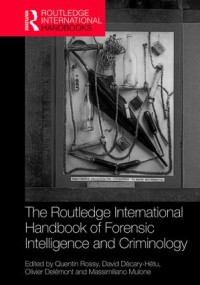Despite a shared focus on crime and its ‘extended family’, forensic scientists and criminologists tend to work in isolation rather than sharing the data, methods and knowledge that will broaden the understanding of the criminal phenomenon and its related subjects.
Bringing together perspectives from international experts, this book explores the intersection between criminology and forensic science and considers how knowledge from both fields can contribute to a better understanding of crime and offer new directions in theory and methodology.
This handbook is divided into three parts:
The objective of this handbook is to stimulate a ‘new’ interdisciplinary take on the study of crime, to show how both forensic and criminological theories and knowledge can be combined to analyse crime problems and to open new methodological perspectives. It will be essential reading for students and researchers engaged with forensic science, criminology, criminal behaviour, criminal investigation, crime analysis and criminal justice.
Visiter la page de David Décary-Hétu
Rossy, Q., Décary-Hétu, D., Delémont, O. & Mulone, M. (2018). Routledge International Handbook of Forensic Intelligence and Criminology. Routledge.
RetourAttention - Votre version d'Internet Explorer est vieille de 21 ans et peut ne pas vous offrir une expérience optimale sur le site du CICC. Veuillez mettre à jour votre ordinateur pour une expérience optimale. Nous vous recommandons Firefox ou Chrome, ou encore ChromeFrame si vous êtes dans un environnement corporatif ou académique dans lequel vous ne pouvez pas mettre à jour Internet Explorer.